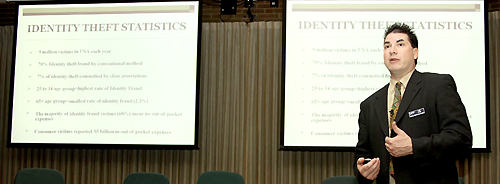
| CONNECTIONS |
IDAHO
ITD
HOME
511 TRAVEL SERVICES
IDAHO
DMV
ITD
NEWS
HIGHWAY
SAFETY
IDAHO STATE POLICE
STATE OF IDAHO
NIATT
NATIONAL
AASHTO
AAMVA
AAA of IDAHO
FEDERAL HIGHWAYS
FEDERAL AVIATION
IDAHO STATE POLICE
NHTSA
NTSB
TRB
U.S. DOT
TRANSPORTER
Archives
Milestones
Comments
Idaho
Transportation
Department
Office of Communications
P.O. Box 7129
Boise, ID 83707
208.334.8005
Fax: 208.334.8563


ITD employees learn how to avoid identity theft
by taking precautions
Dead or alive, you easily can fall victim to someone who wants to be you – if just for a little while.
And the cost could be staggering.
Online resources Identity Theft Resource Center www.idtheftcenter.org Credit reporting agencies Equifax www.equifax.com |
Identity theft is one of the fastest growing crimes in the United States, costing victims more than $5 billion each year, so the Headquarters’ Safety Committee sponsored two well-attended presentations Wednesday on how to protect against the crime.
“These are your finances folks, and you need to take care of them,” said Daniel Kline, Idaho Department of Finance consumer credit examiner/investigator. “If something happens, I assure you that nobody cares about you except you.”
Nationwide, 9 million people have their identities stolen each year. The age group with the highest rate of identity fraud is 25 to 34. Seniors 65 and older experience the smallest rate of identity fraud, representing less than 2.5 percent of all cases.
The most common type of identity theft involves simply finding or stealing credit cards, debit cards, checks, check stubs, drivers’ licenses or official identification cards.
 “Dumpster diving” is another common means for acquiring personal data. Kline suggests that people use paper shredders that cut two ways for disposal of documents with personal information.
“Dumpster diving” is another common means for acquiring personal data. Kline suggests that people use paper shredders that cut two ways for disposal of documents with personal information.
Malicious and imposter Web sites, “phishing” through e-mail or instant messages, “skimming” credit card information with hand-held card readers and “vishing” – acquiring personal information over the telephone with auto-dialers or “war” dialers that encourage calls to fake numbers representing legitimate institutions – are popular high-tech means of committing identity theft.
Kline said that false changes of address filed through the Post Office and pretexting -- the practice of getting your personal information under false pretenses -- also are ways thieves steal identities.
He offered tips to help prevent identity theft:
-
Be wary when asked to provide personal information over the telephone, through the Web, by way of paperwork requests and via email.
-
Guard your mail by tearing up or shredding pre-approved credit card applications, monitoring mail pickups and deliveries and opting for paperless statements.
-
Check your credit report once each year for free by logging on to www.annualcreditreport.com or calling (877) 322-8228.
-
Remove your name from mailing lists prepared by the credit bureaus by calling (888) 567-8688.
-
Keep your computer protected with up-to-date anti-virus software and delete browsing history after conducting online financial transactions.
If you become a victim of identity theft, Kline advises to first file a police report. Steps that follow include filing reports with each of your creditors and financial institutions, and filing a complaint with the Federal Trade Commission’s Identity Theft Data Clearinghouse – a national database available to law enforcement.
Additional places he suggesting contacting include the U.S. Postal Service, Social Security Administration, Internal Revenue Service, utility companies and check reporting companies such as CheckRite or TeleCheck.
Finally, consider a credit freeze and contact the three major credit reporting agencies: Equifax, Experian and TransUnion. (See inset above for Web site addresses.)
Published 6-5-09